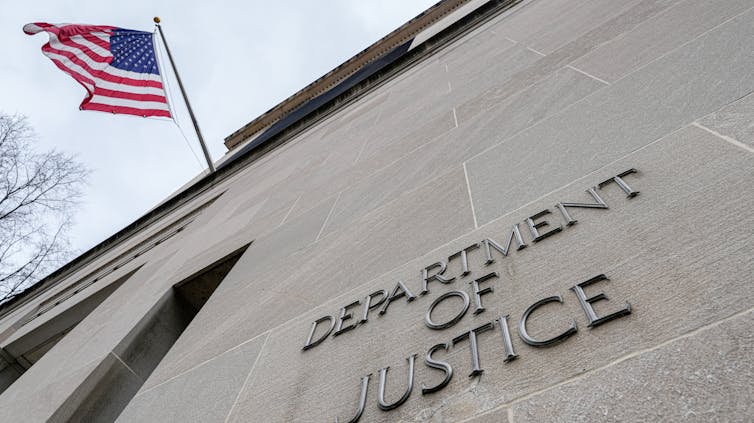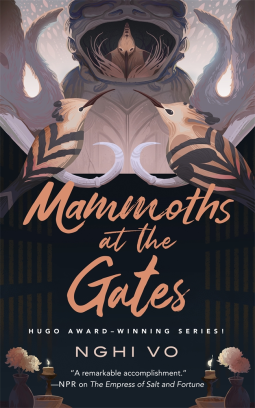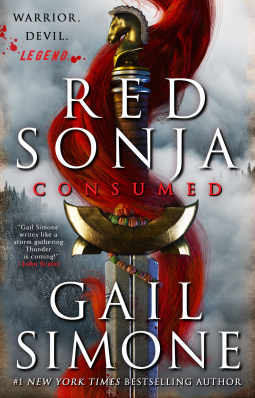Martha Wells has become one of my favorite authors. I loved
her “Raksura” series and was bowled over by her “Murderbot” novellas. I thought
I would follow her across genres. Two of her recent releases soar in terms of
world-building imagination, but fall short in dramatic shaping and plot
structure.
Witch King, by Martha Wells (Tor)
Witch King opens with a mystery as demon Kai (not “a”
demon, THE demon) wakes up in captivity with a mage attempting to seize control
of his magic. His immediate goal is to free himself and locate his companions.
This proves to be both easier and far more challenging than it appears on the
surface. For one thing, Kai’s last (dead) host body has been murdered and he’s
in another, quite unfamiliar (and much less fit) body; for another, he has no
idea how much time has elapsed since he’s been unconscious (a lot), what
political changes are afoot in the world, and where the wife of his closest
ally has disappeared to.
So far, so good, and Wells does a superb job in introducing
complex characters, an unusual system of magic, and millennia of history and
world-building without dumping expository lumps on the reader.
Wells then shifts to the distant past when Kai inhabited a
volunteer body and lived in a rich, joyful, and emotionally warm culture. From
here, the two timelines alternate chapters. A few characters, such as Kai who
is almost immortal, appear throughout, but many others (many, many others) are
specific only to one. Still more are alive and active in the past but distant
memories in the present. Because the focus is on Kai and a few others who are
present in both times, I had to search for other clues as to where and when I
was.
Both storylines are filled with action and wonderful
characters, situations, and relationships. Each one would be more than enough
for a novel in itself. Some readers will love the weaving back and forth and
all the myriad ways the past informs and shapes the present. I was one of them,
but only at first. As the book went on, however, I found it increasingly
frustrating trying to orient myself—which time is this? what’s been going on?
who’s still alive? and, most importantly, what is the present goal or threat
for the protagonist? There didn’t seem to be a single plot arc, a building
dramatic tension that carried through in both past and present. It didn’t help
that my favorite character from the past is long since dead in the present. Within
each timeline, unrelated problems arise and are resolved. I could never figure
out what the overall “Big Bad” was, especially after one candidate villain
after another is eliminated. The “Big Bad” at the end seemed to come out of
nowhere. Mark Twain famously said that life is “one damned thing after
another.” Fiction must play by a different set of rules.
Witch King is hugely ambitious, filled with
imaginative elements, compelling personal drama, and a huge landscape across
time as well as space. Wells handles these elements with the effortless skill
of a seasoned professional, but fails to shape them into a single dramatic story.
Wheel of the Infinite, by Martha Wells (Tor)
Wheel of the Infinite starts with a fortuitous
encounter on the road between Maskelle, a confident and immensely powerful
magic wielder, and handsome, enigmatic swordsman Rian. After she saves his
life, he and a band of motley other characters accompany Maskelle to the heart
of the Celestial Empire. Much later, we learn that she’s returning from exile
after being judged a traitor and much, much later, that her task is to help
remake the beautiful, orderly mandala known at the Wheel of the Infinite,
thereby ensuring peace and harmony for the Empire. At turns, the action moves
swiftly with leaps of dramatic tension or as slowly as any travelogue. In this,
it reminded me of
The Lord of the Rings (the books, not the movies),
which alternated between seat-of-the-pants action and pages upon pages of
passing scenery. Also that there’s a quest, although in
Rings, the
mission is much more clear and consistently present.
Maskelle was one of my favorite characters in a long while.
She’s an older woman, always a plus with me, she’s quite comfortable with her
sexuality (double plus), and she’s terrifyingly competent as a magician (triple
plus). Once the question of whether she’ll decide it wise to take Rian as her
lover is settled, he pales by contrast as a character. Many, many other
characters appeared (and disappeared, some temporarily, others not so much) but
weren’t around for long enough to engage my sympathy.
As with Witch King, the premise, world-building,
magical system, and protagonist in Wheel of the Infinite were all
marvelous. The book is highly ambitious, offering fresh, original takes on
time-honored tropes. Its sheer size and scope break down under their own weight.
It’s as if Wells, whose novellas and shorter novels are tightly plotted gems,
hasn’t quite made the leap to books of this length and complexity.
Nevertheless, both are enjoyable reads with many twists and innovations. While
neither worked perfectly for me, I’m eager to read her next project.









